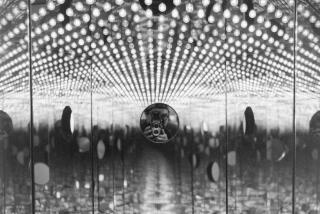A Zoom With a View
- Share via
When Los Angeles photographer Eric Grigorian won the Photo of the Year 2002 Award in the World Press Photo Contest recently, his reaction was a simple “You’re kidding!” An apropos response, perhaps, considering that more than 53,000 photos from thousands of photographers are submitted in the annual Amsterdam-based contest. Grigorian, 33, is a Tehran-born Armenian who moved to Los Angeles with his family at age 9, just before the Iranian revolution in the late ‘70s. He studied photography at Pierce College and San Jose State University, but the real lessons are learned in the real world, says Grigorian, who has since covered tumultuous spots in the Middle East and the former Soviet Union. He took his winning shot in Iran just after the 2002 earthquake in the northwestern Qazvin province that killed about 500 people.
What does your winning image show?
Technically, it’s a photo of a crying little boy squatting by a mass grave where, I think, his entire family--or much of it--is being buried. He’s holding onto a pair of his father’s dirty pants. Emotionally, I think it’s about the end of [his] world.
As a photojournalist, you enter people’s lives at their most painful moments. How do you deal with that?
At the earthquake [area], I really lost it. People are crying and weeping and their world has exploded. You’re trying to convince yourself that there’s no point in being [there] if I’m not taking pictures. I took a few pictures--including this one--and I had to go away. It was just too much.
What do you try to capture in a photograph?
Consistency of mood, a certain somberness. I’m trying to capture [what] other people could not or would never see.
How do you distinguish yourself from paparazzi? If you were near Princess Diana’s car crash, would you have taken photographs? How is that different from taking a photograph of a child hit by shrapnel?
The difference is the paparazzi creates things; they were running up against the car, hounding, chasing, inciting. A photojournalist documents. I would have taken pictures [of Diana’s death].
What do you think is the biggest misconception about the Middle East?
Many people--not just Americans, but Westerners in general--see the people as one with the government. A lot of my work is to show the government is its own entity. The only reason the people live under them is because they have no choice. The other misconception is that it’s all one big desert. It is in fact quite mountainous, something the U.S. government found out in Afghanistan.
What was your experience in Gaza?
I went with the idea of covering the Israeli army entering Gaza. It really opened my eyes [to the fact that] the Palestinian people must be going through some horrible experiences to be doing what they’re doing. I saw the conditions they were living in. They’re dirty, horrible places to be, let alone live. It’s often hard to photograph kids in these places, as kids don’t understand you just want to document them. They think you’re there to take pictures of them holding up the peace sign and smiling into the camera.
Do you want to do combat photographs?
In my early I-want-to-change-the-world days I did because I wanted to show how wrong war is. Now I realize you can actually die. Then I thought, “Well, if I die, I die.”
What’s your opinion of the combat training now given to reporters and photographers?
I think it’s ridiculous. I don’t want to go to Iraq in army gear. I want to be where the people are and act like they do. It’s silly to go in like that; you’re covering a family you hope to make comfortable with you and you have a gas mask on.
Do you have a fantasy shot?
I don’t know if there is such a photograph. Eddie Adams’ shot of the Viet Cong soldier getting shot in the head and Nick Ut’s photo of the children being napalmed were profound documents. [But] I wouldn’t want there to be an ultimate shot. Someone once told me, “If I can take one good photograph a year, in 50 years I can put out a book of my life’s work.” That would be a great accomplishment.


